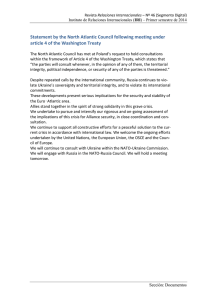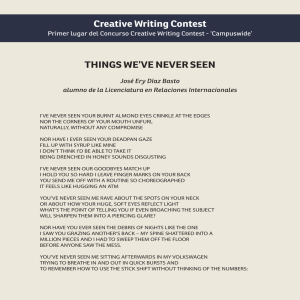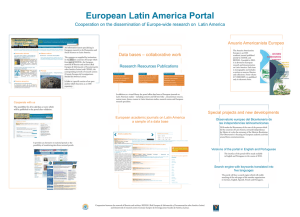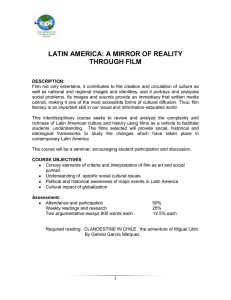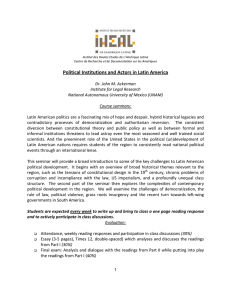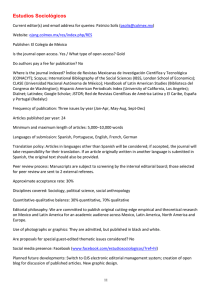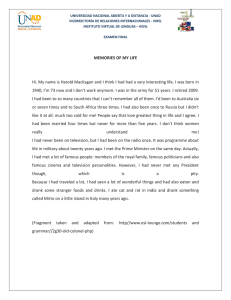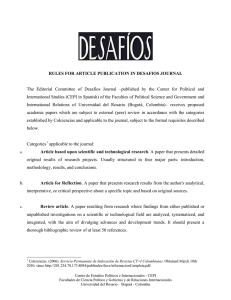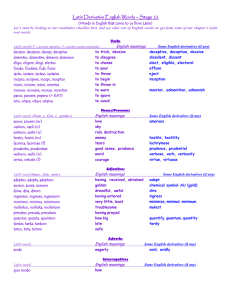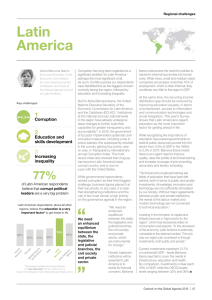The Study of International Relations In Latin America
Anuncio
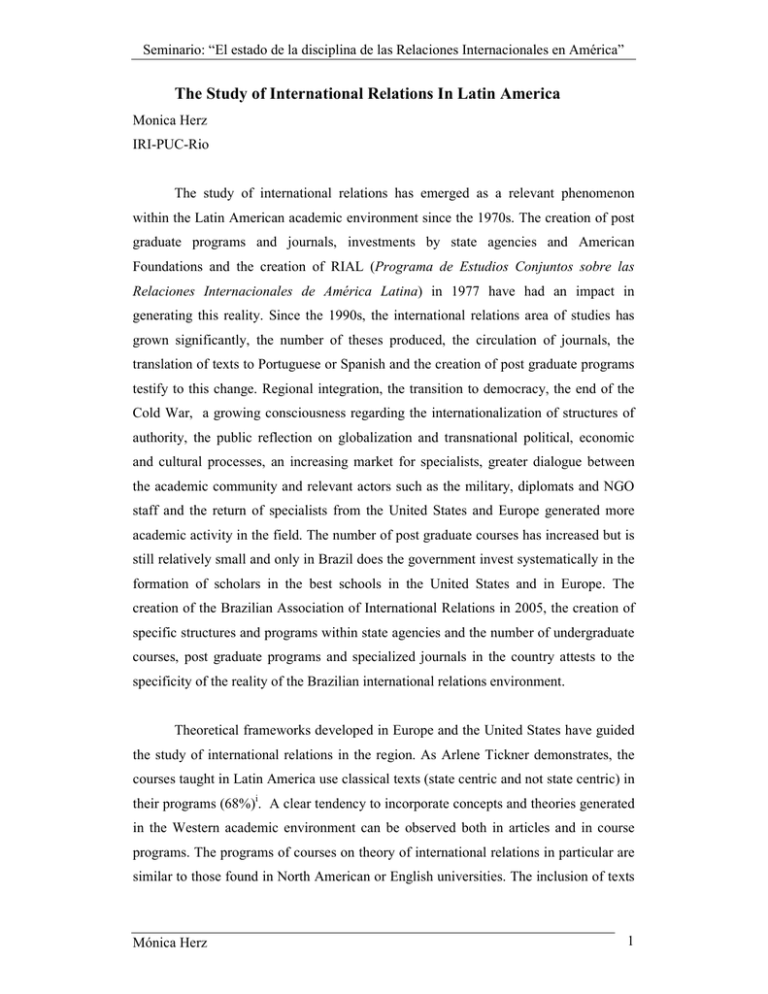
Seminario: “El estado de la disciplina de las Relaciones Internacionales en América” The Study of International Relations In Latin America Monica Herz IRI-PUC-Rio The study of international relations has emerged as a relevant phenomenon within the Latin American academic environment since the 1970s. The creation of post graduate programs and journals, investments by state agencies and American Foundations and the creation of RIAL (Programa de Estudios Conjuntos sobre las Relaciones Internacionales de América Latina) in 1977 have had an impact in generating this reality. Since the 1990s, the international relations area of studies has grown significantly, the number of theses produced, the circulation of journals, the translation of texts to Portuguese or Spanish and the creation of post graduate programs testify to this change. Regional integration, the transition to democracy, the end of the Cold War, a growing consciousness regarding the internationalization of structures of authority, the public reflection on globalization and transnational political, economic and cultural processes, an increasing market for specialists, greater dialogue between the academic community and relevant actors such as the military, diplomats and NGO staff and the return of specialists from the United States and Europe generated more academic activity in the field. The number of post graduate courses has increased but is still relatively small and only in Brazil does the government invest systematically in the formation of scholars in the best schools in the United States and in Europe. The creation of the Brazilian Association of International Relations in 2005, the creation of specific structures and programs within state agencies and the number of undergraduate courses, post graduate programs and specialized journals in the country attests to the specificity of the reality of the Brazilian international relations environment. Theoretical frameworks developed in Europe and the United States have guided the study of international relations in the region. As Arlene Tickner demonstrates, the courses taught in Latin America use classical texts (state centric and not state centric) in their programs (68%)i. A clear tendency to incorporate concepts and theories generated in the Western academic environment can be observed both in articles and in course programs. The programs of courses on theory of international relations in particular are similar to those found in North American or English universities. The inclusion of texts Mónica Herz 1 Seminario: “El estado de la disciplina de las Relaciones Internacionales en América” by authors from Latin American or from other regions is extremely rare. Moreover the majority of articles and books produced in Latin America on international relations in the last decades were the result of empirical research and are descriptive in nature. The state is the object and actor to which the analysis of the international system leads most Latin America scholars. Despite the important differences between the authors and analysis available, the generation of a common ontology can be detected. The distribution of power between states is at the core of the research done. The cultural landscape must be mentioned here to account for the tendency to focus on the state. The role states have played in the construction of the idea of nation, in the creation of national institutions and development projects throughout Latin America facilitates the embedding of state-centric perspectives. Two major preoccupations have shaped the literature and the teaching on international relations in Latin America: the possibilities and difficulties regarding political and economic autonomy for Latin American countries and other peripheral states in the international system and the role of international institutions. Since the 1970s, the concern with autonomy, particularly vis a vis the United States, has been at the forefront of the debate on international relations in the region, largely understood in terms of the distribution of power. The power structure of the international system was examined from the perspective of the south, its oligarchic nature and the possible loopholes to be explored having been emphasizedii. In the 1970s, and thereafter, authors such as Hélio Jaguaribbe and Celso Lafer pursued this path. The concern with dependency and the reproduction of power relations that are not favorable to the countries of the region has been a main theme, usually tackled in terms easily recognizable as realist. The level of strategic autonomy feasible in the context of American hegemony has always been a central discussion both in the academic and political settings. Traditionally the search for autonomy was associated with the creation of a scientific and technological capacity or with the construction of alternative alliances within the Cold War context and after that period. Thus relations with the Soviet Union (and Russia), China, South Africa and India have been looked into in this context. In fact Dependencia theory is considered the major Latin America theoretical contribution to the study of international relations and political economyiii. Modernity, development and the power structure of the international system were viewed from a perspective that focused on the relation between the capitalist global Mónica Herz 2 Seminario: “El estado de la disciplina de las Relaciones Internacionales en América” expansion and the reproduction of inequality and dependency. It represented a contribution from the periphery to a discussion that usually excludes voices from beyond the western countries. But after dependencia theory, no new theoretical contribution with significant impact emerged from the Latin American academic world. Tickner refers to the “Latin American hybrid” as a fusion of concepts stemming from dependency theory, realism and interdependencyiv. The possible changes to the rules of the game that govern international relations are the normative background of the authors she associated with this label. Finally, more recently, Carlos Escudé looked into the same problem departing from the idea of citizen wellbeing and developmentv. In line with this feature of the literature, Federico Merke points out that the international system is portrait in a hierarchical manner whereas the hegemonic concept in Europe and the United States is anarchyvi. On the other hand, the legalist tradition is in tune with the focus on international institutions. The study of cooperation in various spheres and regional integration in particular are themes found in abundance in the Latin America IR literature. The diplomatic legalist tradition in the region and the search for multilateral forums where the countries can be protected from power asymmetry explain this feature. Moreover the most traditional theme in the IR literature - war and peace - has not been relevant for the development of the discipline in Latin America. Thus the Institutional (liberal) theoretical framework has been incorporated by the specialists in their writings and is widely present in course programs. The English school with its emphasis on order has also been influential. In the last ten years constructivist perspectives have been gaining influence allowing for a perspective which sheds lights on the history of institutions. The attempts to revitalize the regional institutions in the region since the 1990s, is the most recent political backdrop for this academic discussion. Moreover most Latin American specialists (as well as governments) firmly adhere to the principle of nonintervention, fearing a wider control by the United States of different aspects of domestic and international politics in the region. There is widespread fear that interventionism could spread into spheres other than security, such as domestic governance and the environment, in a context of the ongoing redefinition of “threats to peace and security”. Thus the debate on new forms of multilateral institutions after the end of the Cold War is considered extremely relevant. In spite of the nature of the insertion of the region in the international system as part of the periphery and a broad tradition of questioning the distribution of power Mónica Herz 3 Seminario: “El estado de la disciplina de las Relaciones Internacionales en América” internationally, critical and postmodern studies have had a very limited influence in the academic production. The search for “silences” generated by the transfer of models, theories and themes from the United States and Europe has not become an endeavor that specialists in Latin America have pursued. The manner in which theories and methodologies travel from the western centers to Latin America, how they influence the selection of empirical objects, research agendas and normative perspectives is not a theme developed by the scholars in the region. The lack of reflection on the state of the study of international relations, in particular the metatheoretical aspects is part of the scenario. The reflection on the history and nature of the discipline, which was so important for the development of the pos positivist debate in international relations circles, did not take root in the regionvii. This contrasts with a tradition of self-reflection in other areas such as sociology and history. The debate on “whom” theory is for or “what” theory is for does not take placeviii. Partly this is the result of a lack of a wider vision of the discipline which until recently was not taught in a systematic manner integrating the literature produced worldwide. On the other hand, concepts are incorporated in a fragmented manner and the connections between epistemological questions and the operationalization of concepts are not discussed. The large majority of the material produced deals with regional issues, Latin American conflicts, Latin American cooperation mechanisms and Latin American foreign policies and military establishments. The study of the history of the foreign policy of specific countries and the analysis of the foreign policy of specific countries are the tasks to which most specialists dedicate their research time. The study of international security has always been marginal in terms of Latin American social science and more specifically the international relations field. The peripheral nature of the insertion of the region in the international system, the domination of regional international relations by the United States, the dire social and economic issues that mobilize Latin American thinkers, the scarcity of traditional security hot conflicts and the fragility of the international relations academic field explain this characteristic of the sub field in the region. Nevertheless during the last ten years as the international relations academic community developed in different countries in the region and as a broader concept of security, more in tune with the issues faced by Latin American societies, became widespread among specialist in the USA and Europe, the debate on security intensified and more texts and researches were produced. Mónica Herz 4 Seminario: “El estado de la disciplina de las Relaciones Internacionales en América” Regarding the autonomy or differentiation of the area of international relations in Latin America the situation is very heterogeneous. But the kind of separation between international relations and other disciplines that can be observed in Europe and North Americaix does not take place. Partly because most scholars working in the field presently graduated in social sciences, political science, history or law, partly because the separation between international issues and domestic issues was never attainable in Latin America. i Arlene Tickner ( 2002), Los Estudios Internacionales En América Latina, Bogota, CESO y Departamento de Ciencia Política de la Universidad de los Andes, Alfaomega Colombiana, p.92. ii For example Celso Lafer (1972), Política de Blocos, Segurança e Desenvolvimento: uma Perspectiva Brasileira, Revista de Administração de Empresas , v.12 n.2 Jun. Celso Lafer (1982) Reflexiones sobre el tema del Nuevo Orden Mundial en un Orden Internacional en Transformación, Estudios Internacionales , n.58, Apr/Jun. Hélio Jaguaribe (1977) A Condição Imperial, Dados, n.15. Hélio Jaguaribe (1980) , Autonomia Periférica e hegemonia Cêntrica, Relações Internacionais, ano3 n.5 , jun. Celso Lafer ( 982), Paradoxos e Possibilidades, Rio de Janeiro, Editora Nova Fronteira. Celso Lafer (1984) , O Brasil e a Crise Mundial, São Paulo, Editora Perspectiva. iii Fernando Henrique Cardoso e Enzo Faleto ( 1979), Dependência e Desenvolvimento na América Latina, Rio de Janeiro, Zahar. iv Arlene Tickner (2002), op. Cit. p.57. v Carlos Escudé (1995), El realismo de los Estados Débiles, Buenos Aires, GEL. vi Federico Merke: Relaciones Internacionales:el Estado de la Disciplina en la Argentina. Presented at the Terceras Jornadas de Investigación Del IDICSO-USAL 10/14/2005. vii Since the 1980s there have been several attempts to map out the literature on international relations in Latin America. Francisco Orrego Vicuña (ed.) (1980), Los Estudios Internacionales en América Latina, Santiago, Instituto de Estudios Internacionales-Editorial Universitaria. Maria Regina Lima e Gerson Moura (1981), Relações internacionais e política externa brasileira: uma resenha bibliográfica, BIB/ANPOCS, Rio de Janeiro n.13 pp.5-36. Rubén Perina (1985), El Estudio de las Relaciones Internacionales en América Latina y el Caribe, Buenos Aires, GEL. Monica Hirst (1992), Relações Internacionais no Brasil como Área de Pesquisa in Sergio Miceli (org.), Temas e problemas da pesquisa em ciências sociais, São Paulo, EDESP. Shiguenoli Miyamoto (1999), O Estudo das Relações Internacionais no Brasil: O Estado da Arte, Revista Sociologia e Política, Curitiba pp.83-98. Paulo Roberto de Almeida (2001), Formação da Diplomacia Econômica no Brasil. As Relações Econômicas Internacionais no Império. São Paulo, Ed. SENAC, Brasília: FUNAG. Mônica Herz (2002), O Crescimento da Área de Relações Internacionais no Brasil. Contexto Internacional, Rio de Janeiro, v. 24, n. 1, pp. 24-40. viii Robert Cox, among others, brought this debate to the attention of international relations specialists. For example Robert Cox (1981), Social Forces, States and World Orders: Beyond International Relations Theory, Millenium , v. 10 n.2. ix See Barry Buzan & Richard Little (2001), Why International Relations has Failed as an Intellectual Project and What to do About it, Millennium: Journal of International Studies 30 1 pp.19-39. Mónica Herz 5
